- Home
- John Green
Will Grayson, Will Grayson Page 22
Will Grayson, Will Grayson Read online
Page 22
“God no,” he says. “There’s a different one for each act.”
I hear in the distance a thunderous roar followed by a horrifying series of splashes, and my first thought is, Tiny has written an elephant into the play, and the elephant has just vomited, but then I realize that Tiny is the elephant.
Against my better judgment, I follow the sound to a bathroom, whereupon it promptly happens again. I can see his feet peeking out the bottom of the stall. “Tiny,” I say.
“BLLLLAAARRRRGGGGH,” he answers, and then
sucks in a desperate wheezing breath before more pours forth. The smell is overpowering, but I step forward and push the door open a bit. Tiny, wearing the world’s largest Sox uniform, hugs the toilet. “Nerves or sickness?” I ask.
“BLLLLLAAAAAAOOOO.” One cannot help but be
surprised by the sheer volume of what pours forth from Tiny’s distended mouth. I notice some lettuce and wish I hadn’t, because then I begin to wonder: Tacos? Turkey sandwich? I start to feel like I may join him.
“Okay, bud, just get it all up and you’ll be fine.”
Nick bursts into the bathroom then, moaning, “The smell, the smell,” and then says, “Do not fuck your hair up, Cooper! Keep that head out of the toilet. We spent hours on that hair!”
Tiny sputters and coughs a bit and then croaks, “My throat. So raw.” He and I realize simultaneously: the central voice of the show is shot.
I take one armpit and Nick takes another and we pull him up and away. I flush, trying not to look into the unspeakable horror in the toilet. “What did you eat?”
“A chicken burrito and a steak burrito from Burrito Palace,” he answers. His voice sounds all weird, and he knows it, so he tries to sing. “What’s second base for a—shit shit shit shit shit I wrecked my voice. Shit.”
With Nick still beneath one Tiny arm and me beneath the other, we walk back toward the crew, and I shout, “I need some warm tea with a lot of honey and some Pepto-Bismol immediately, people!”
Jane runs up wearing a white, men’s v-neck T-shirt, Sharpie-scrawled with the words I’m with Phil Wrayson.
“I’m on it,” she says. “Tiny, you need anything else?” He holds up a hand to quiet us and then groans, “What is that?”
“What is what?” I ask.
“That noise. In the distance. Is that—is that—goddamn it, Grayson, did you put ‘Over the Rainbow’ on the preshow CD?”
“Oh yes,” I say. “Repeatedly.”
“TINY COOPER HATES ‘OVER THE RAINBOW’!” His voice cracks as he screams. “Shit, my voice is so gone. Shit.”
“Stay quiet,” I say. “We’re gonna fix this, dude. Just don’t puke anymore.”
“I am bereft of burrito to puke,” he answers.
“STAY QUIET,” I insist.
He nods. And for a few minutes, while everyone runs around fanning their pancake faces and whispering to one another how great they’ll be, I’m alone with a silent Tiny Cooper. “I didn’t know you could get nervous. Do you get nervous before football games?” He shakes his head no. “Okay, just nod if I’m right. You’re scared the play isn’t actually that good.” He nods. “Worried about your voice.” Nod. “What else? Is that it?” He shakes his head no. “Um, you’re worried it won’t change homophobic minds.” No. “You’re worried you’ll hurl onstage.” No. “I don’t know, Tiny, but whatever you’re worried about, you’re bigger than the worries. You’re gonna kill out there. The ovation will last for hours. Longer than the play itself.”
“Will,” he whispers.
“Dude, save the voice.”
“Will,” he says again.
“Yeah?”
“No. Will.”
“You mean the other Will,” I say, and he just raises his eyebrows at me and smirks.
“I’ll go look,” I say. Twenty minutes to curtain, and the auditorium is now damn near full. I stand on the edge of the stage looking out for a second, feeling a little bit famous. Then I jog down the stairs and slowly walk up the stage-right aisle. I want him here, too. I want it possible for people like Will and Tiny to be friends, not just tried errors.
Even though I feel like I know Will, I barely remember what he looks like. I try to exclude each face in each row. A thousand people texting and laughing and squirming in their seats. A thousand people reading the program in which, I later learn, Jane and I are specially thanked for “being awesome.” A thousand people waiting to see Gary pretend to be me for a couple hours, with no idea what they’re about to see. And I don’t know, either, of course—I know the play has changed in the months since I read it, but I don’t know how.
All these people, and I try to look at every last one of them. I see Mr. Fortson, the GSA advisor, sitting with his partner. I see two of our assistant principals. And then as I get into the middle, my eyes scanning faces looking for Will Graysony ones, I see two older faces staring back at me on the aisle. My parents.
“What are you doing here?”
My father shrugs. “You will be surprised to learn it was not my idea.”
Mom nudges him. “Tiny wrote me a very nice Facebook message inviting us personally, and I just thought that was so sweet.”
“You’re Facebook friends with Tiny?”
“Yes. He request-friended me,” Mom says, epically failing to speak Facebook.
“Well, thanks for coming. I’m gonna be backstage but I’ll, um, see you after.”
“Say hi to Jane for us,” Mom says, all smiley and conspiratorial.
“Will do.”
I finish making my way up the aisle and then walk back the stage-left aisle. No Will Grayson. When I get backstage, I see Jane holding a supersize bottle of Pepto-Bismol.
She turns it upside down and says, “He drank it all.”
Tiny jumps out from behind the set and sings, “And now I feel GrrrrrEAT!” His voice sounds fine for the moment.
“Rock ’n’ roll,” I tell him. He walks up to me and looks at me askingly. “There’s like twelve hundred people in the audience, Tiny,” I say.
“You didn’t see him,” he says, nodding softly. “Okay. Yeah. Okay. That’s okay. Thanks for making me shut up.”
“And flushing your ten thousand gallons of vomit.”
“Sure, also that.” He takes a big breath and puffs out his cheeks, rendering his face almost perfectly circular. “I guess it’s time.”
Tiny gathers the cast and crew around him. He kneels in the center of a thick mass of people, everyone touching everyone because one of the laws of nature is that theater people love to be touchy. The cast is in the first circle around Tiny, everyone—guy and girl—dressed like White Sox. Then the chorus, dressed all in black for the moment. Jane and I lean in, too. Tiny says, “I just want to say thank you and you’re all amazing and it’s all about falling. Also I’m sorry I hurled earlier. I was hurling because I actually got awesome-poisoning from being around so many awesome people.” That gets a bit of nervous laughter. “I know you’re freaked out but just trust me: you’re fabulous. And anyway, it’s not about you. Let’s go make some dreams come true.”
Everyone kind of shouts and does this thing where we raise up one hand to the ceiling, and then there are a lot of jazz fingers. The light beneath the curtain is extinguished. Three football players push the set forward into its place. I step off to the side, standing in cave-darkness next to Jane, whose fingers interlace with mine. My heart pounds, and I can only imagine what it’s like to be Tiny now, praying that a quart of Pepto-Bismol will coat his vocal cords, that he won’t forget a line or fall or pass out or hurl. It’s bad enough in the wings, and I realize the courage it actually takes to get onstage and tell the truth. Worse, to sing the truth.
A disembodied voice says, “To prevent interruptions of the fabulousness, please turn off your cell phones.” I reach into a pocket with my free hand and click mine over to vibrate. I whisper to Jane, “I might puke,” and she says, “Shh,” and I whisper, “Hey, are my clothes always super
wrinkly?” and she whispers, “Yes. Shh,” and squeezes my hand. The curtain parts. The applause is polite.
Everyone in the cast sits on the dugout bench except for Tiny, who walks nervously back and forth in front of the players. “Come on, Billy. Be patient, Billy. Wait for your pitch.” I realize that Tiny isn’t playing Tiny; he’s playing the coach.
Some pudgy freshman plays Tiny instead. He can’t stop moving his legs around; I can’t tell if he’s acting or nervous. He says, all exaggeratedly effeminate, “Hey, Batta Batta THWING batta.” It sounds like he’s flirting with the batter.
“Idiot,” someone on the bench says. “Our guy is batting.”
Gary says, “Tiny’s rubber. You’re glue. Whatever you say bounces off him and sticks to you.” I can tell from his sloping shoulders and meek look that Gary’s me.
“Tiny’s gay,” adds someone else.
The coach wheels around to the bench and shouts. “Hey! HEY! No insulting teammates.”
“It’s not an insult,” Gary says. But he isn’t Gary anymore. It isn’t Gary talking. It’s me. “It’s just a thing. Like, some people are gay. Some people have blue eyes.”
“Shut up, Wrayson,” the coach says.
The kid playing Tiny glances gratefully at the kid playing me, and then one of the bullies stage-whispers, “You’re so gay for each other.”
And I say, “We’re not gay. We’re eight.” This happened. I’d forgotten it, but seeing the moment resurrected, I remember.
And the kid says, “You want to go to second base . . . WITH TINY.”
The me onstage just rolls his eyes. And then the pudgy kid playing Tiny stands up and takes a step forward, in front of the coach and sings, “What’s second base for a gay man?” And then Tiny takes a step forward and joins him, harmonizing, and they launch into the greatest musical song I’ve ever heard. The chorus goes: What’s second base for a gay man?
Is it tuning in Tokyo?
I can’t see how that would feel good
But maybe that’s how it should go?
Behind the two Tinys singing arm in arm, the guys in the chorus—including Ethan—pull off a hilariously elaborate old-fashioned, high-stepping, highly choreographed dance, their bats used as canes and their ball caps as top hats. Midway through, half the guys swing their bats toward the heads of half the others, and even though from my side view I can see it’s totally faked, when the other boys fall backward dramatically and the music cuts out, I gasp with the audience. Moments later, they all jump up in a single motion and the song starts up again. When it’s done, Tiny and the kid dance offstage to thunderous shouts from the crowd, and as the lights cut, Tiny damn near lands in my arms, bathed in sweat.
“Not bad,” he says.
I just shake my head, amazed. Jane helps him out of his shoes and says, “Tiny, you’re kind of a genius.” He rips off his baseball uniform to reveal a very Tiny purple polo shirt and chino shorts.
“I know, right?” he says. “Okay, time to come out to the folks,” he says, and hustles out onto the stage. Jane grabs my hand and kisses me on the neck.
It’s a quiet scene, as Tiny tells his parents he’s “probably kinda gay.” His dad is sitting silent while his mom sings about unconditional love. The song is only funny because Tiny keeps cutting in with other comings-out each time his mom sings, “We’ll always love our Tiny,” like, “Also, I cheated in algebra,” and, “There’s a reason your vodka tastes watered down,” and “I feed my peas to the dog.”
When the song ends, the lights go down again, but Tiny doesn’t leave the stage. When the lights go back up, there’s no set, but judging from the elaborately costumed cast, I gather we’re at a Gay Pride Parade. Tiny and Phil Wrayson stand center stage as people march past, chanting their chants, waving dramatically. Gary looks so much like me it’s weird. He looks more like freshman-year me than Tiny looks like freshman-year Tiny.
They talk for a minute and then Tiny says, “Phil, I’m gay.”
Stunned, I say, “No.”
And he says, “It’s true.”
I shake my head. “You mean, like, you’re happy?”
“No, I mean, like, that guy,” he points at Ethan, who’s wearing a skintight yellow wifebeater, “is hot and if I talked to him for a while and he had a good personality and respected me as a person I would let him kiss me on the mouth.”
“You’re gay?” I say, seemingly uncomprehending.
“Yeah. I know. I know it’s a shock. But I wanted you to be the first to know. Other than my parents, I mean.”
And then Phil Wrayson breaks out into song, singing more or less exactly what I said when this really happened: “Next you’re gonna tell me the sky is blue, that you use girl shampoo, that critics don’t appreciate Blink 182. Oh, next you’re gonna tell me the Pope is Catholic, that hookers turn tricks, that Elton John sucks HEY.”
And then the song turns into a call and response, with Tiny singing his surprise that I knew he was gay and me singing that it was obvious.
“But I’m a football player.”
“Dude, you couldn’t be gayer.”
“I thought my straight-acting deserved a Tony.”
“But, Tiny, you own a thousand My Little Ponies!” And so on. I can’t stop laughing, but more than that, I can’t believe how well he remembers it all, how good—for all of our bad—we’ve always been to each other. And I sing, “You don’t want me, do you?” And he answers, “I would prefer a kangaroo,” and behind us the chorus high-kicks like the Rockettes.
Jane puts her hands on a shoulder to bend me down and whispers, “See? He loves you, too,” and I turn to her and kiss her in the quick dark moment between the end of the song and the beginning of the applause.
As the curtain closes for a set change, I can’t see the standing ovation, but I can hear it.
Tiny runs offstage, shouting “WOOOOOOOOOT!” “It could actually go to Broadway,” I tell him.
“It got a lot better when I made it about love.” He looks at me, smiling with half his mouth, and I know that’s as close as he’ll ever come. Tiny’s the gay one, but I’m the sentimentalist. I nod and whisper thanks.
“Sorry if you come across a little annoying in this next part.” Tiny reaches up to touch his hair and Nick appears out of nowhere, diving over an amp to grab Tiny’s arm, screaming, “DO NOT TOUCH YOUR PERFECT HAIR.” The curtain rises, and the set is a hallway in our school. Tiny’s putting up posters. I’m annoying him, that catch in my voice. I don’t mind it, or at least I don’t mind it much—love is bound up in truth, after all. Just after that scene, there’s one with Tiny drunk at a party in which the character Janey gets her only time onstage—a duet with Phil Wrayson sung on opposite sides of a passed-out Tiny, the song culminating in Gary’s voice suddenly toughening into confidence and then Janey and me leaning over Tiny’s mumbling half-conscious body and kissing. I can only half watch the scene, because I keep wanting to see Jane’s smile as she watches.
The songs get better and better from there, until, in the last song before intermission, the whole audience is singing along as Oscar Wilde sings over a sleeping Tiny, The pure and simple truth
Is rarely pure and never simple.
What’s a boy to do
When lies and truth are both sinful?
As that song ends, the curtain closes and the house lights come up for intermission. Tiny runs up to us and puts a paw on each of our shoulders and lets forth a yawp of joy. “It’s hilarious,” I tell him. “Really. It’s just . . . awesome.”
“Woot! The second half’s a lot darker, though. It’s the romantic part. Okay okay okay okay, see you after!” he says, and then races off to congratulate, and probably chastise, his cast. Jane takes me off into a corner backstage, secluded behind the set, and says, “You really did all that? You looked after him in Little League?”
“Eh, he looked after me, too,” I say.
“Compassion is hot,” she says as we kiss. After a while, I see the houselights dim
and then come back up. Jane and I head back to our stage-side vantage point. The houselights go down again, signaling the end of intermission. And after a moment, a voice from on high says, “Love is the most common miracle.”
At first I think God is, like, talking to us, but I quickly realize it’s Tiny coming in over the speakers. The second half is beginning.
Tiny sits on the front edge of the stage in the dark, saying, “Love is always a miracle, everywhere, every time. But for us, it’s a little different. I don’t want to say it’s more miraculous,” he says, and people laugh a little. “It is, though.” The lights come up slowly, and only now do I see that behind Tiny is an actual honest-to-God swing set that seems to have been possibly literally dug out of a playground and transported to the stage. “Our miracle is different because people say it’s impossible. As it sayeth in Leviticus, ‘Dude shall not lie with dude.’” He looks down, and then out into the audience, and I can tell he is looking for the other Will and not finding him. He stands up.
“But it doesn’t say that dude shall not fall in love with dude, because that’s just impossible, right? The gays are animals, answering their animal desires. It’s impossible for animals to fall in love. And yet—”
Suddenly, Tiny’s knees buckle and he collapses in a heap. I jolt up and start to run onstage to pick him up, but Jane grabs a fistful of my shirt as Tiny raises his head toward the audience and says, “I fall and I fall and I fall and I fall and I fall.”
And at that very moment, my phone buzzes in my pocket. I dig it out of my pocket. The caller ID reads Will Grayson.
chapter twenty
what’s in front of me is the trippiest thing i’ve ever seen. by far.
i honestly didn’t think gideon and i would make it on time. chicago traffic is unkind to begin with, but in this case it was moving slower than a stoner’s thoughts. gideon and i had to have a swearing contest in order to calm ourselves down.

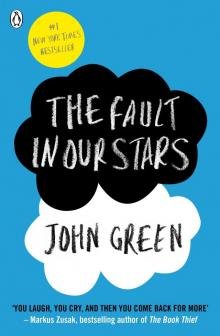 The Fault in Our Stars
The Fault in Our Stars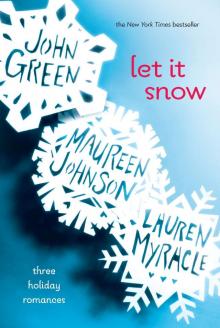 Let It Snow
Let It Snow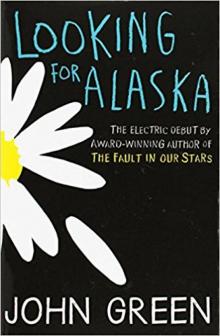 Looking for Alaska
Looking for Alaska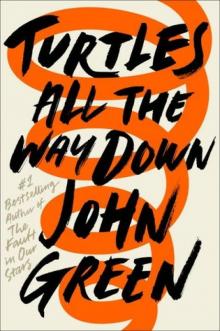 Turtles All the Way Down
Turtles All the Way Down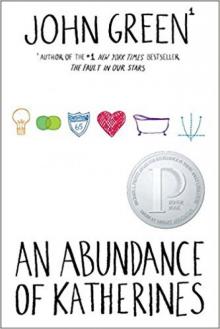 An Abundance of Katherines
An Abundance of Katherines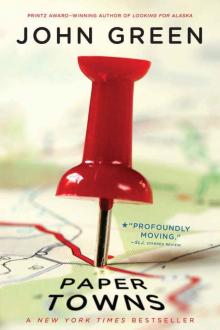 Paper Towns
Paper Towns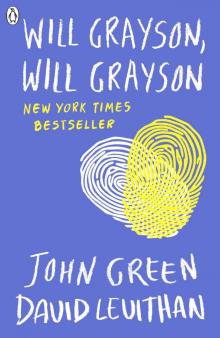 Will Grayson, Will Grayson
Will Grayson, Will Grayson